Florida Usury Laws in 2026: What You Should Know About Interest Rate Limits
Most people don’t realize there are actual laws limiting how much interest lenders can charge. Seriously. In Florida, those limits exist, and they matter a lot if you’re borrowing money. The penalties for breaking these laws can be harsh. Let’s break down exactly what you need to know.
Okay, pause. Read this carefully. Understanding usury laws could save you thousands of dollars. It’s more common than you think for lenders to break these rules, sometimes by accident. So let’s get into it.
What Is Usury?

Usury is basically charging too much interest on a loan. Think of it like a speed limit for interest rates. Just like you can’t drive 100 miles per hour in a 25 mph zone, lenders can’t charge any interest rate they want in Florida.
Florida has specific limits on how much interest a lender can charge you. Right? If a lender charges more than the legal limit, they’ve broken usury laws. This applies to most types of loans, from personal loans to home loans.
Here’s the important part: usury laws protect borrowers. They prevent predatory lending. They keep lenders from charging rates that would trap people in debt forever.
Basic Florida Usury Laws
Standard Interest Rate Limits
Wondering what the actual limits are? Here they are. For loans without a specific agreement about interest rates, Florida law sets a maximum rate of 18% per year. That’s the default if nothing is written down.
But wait, it gets more interesting. If you have a written loan agreement, the parties can agree to almost any interest rate. The agreement needs to be in writing. It needs to be clear. Both the lender and borrower must sign it.
Yep, that’s the catch. The 18% limit mainly applies when there’s no written agreement. Most commercial loans and personal loans have written agreements that can include higher rates. The law gives both sides freedom to negotiate if it’s in writing.
Different Types of Loans
Not sure what counts as a loan? Let me break it down. The usury rules apply differently depending on what kind of loan you’re taking out.
For consumer loans under $500,000, the parties can agree to any interest rate if it’s in writing. For smaller loans between $2,000 and $500,000, the limit is still higher than the 18% default rate. The rules get complicated depending on the loan amount and type.
Home loans work a little differently. Mortgage lenders follow federal regulations too. The state and federal rules work together. Usually, the federal rules are stricter, so they end up controlling the maximum rate.
What Makes a Loan Agreement Legal?

Hold on, this part is important. Not every interest rate agreement is valid under Florida law. The agreement has to meet certain requirements. Both parties need to truly agree. The terms need to be clear and in writing.
The lender can’t trick you into accepting a rate you didn’t understand. The rate can’t be hidden in the fine print. It has to be stated clearly upfront. Florida courts take this seriously when they review loan disputes.
Here’s what most people miss: the interest rate needs to be disclosed before you sign anything. You should know the exact rate you’re paying before you commit. If the lender hides the rate or changes it later, that’s a red flag.
Penalties and Consequences
So what happens if a lender breaks usury laws? The penalties can hit hard. Really hard. Let’s talk about what lenders face when they charge too much interest.
First, the lender loses the right to collect the interest that exceeds the legal limit. They only get paid the allowed rate. Basically, overcharging doesn’t work. The extra money can’t be collected legally.
In some cases, Florida courts will award the borrower damages. If the violation is intentional, the lender might owe three times the amount overcharged. That’s called treble damages. It’s a serious penalty that hurts lenders financially.
Think of it like a traffic ticket, but with money instead of fines. Breaking usury laws is illegal. Getting caught costs the lender significantly. They lose the excess interest plus they might owe extra damages to you.
Some lenders face criminal charges for usury violations. This happens when the violation is especially serious or repeated. Criminal usury is a felony in Florida. It can result in prison time, not just money penalties. That’s why some lenders are careful about following the rules.
Recent Changes and Updates

Florida’s usury laws have stayed pretty stable over the years. The core 18% default rate hasn’t changed recently. But enforcement has become stricter in recent years. Regulators are paying more attention to predatory lending practices.
Digital lending and online loans have created new challenges. Online lenders sometimes claim to be based in other states to avoid Florida’s rules. That doesn’t always work. Florida courts have said that if the loan targets Florida residents, Florida law applies.
Here’s where it gets interesting: payday loans operate in a gray area. These short-term loans used to charge astronomical rates. New regulations in recent years have brought more oversight to payday lenders. The rates are still high, but they’re more limited now than they used to be.
Special Circumstances and Exceptions
Many people assume these laws don’t apply to them. They’re wrong. But there are a few exceptions worth understanding. Let me explain when usury laws might not apply.
Business loans between sophisticated parties sometimes have exceptions. If both sides are experienced in lending and borrowing, the rules can be more flexible. Government loans are exempt from usury limits. Loans from the government don’t have the same restrictions.
Licensed lenders like banks and credit unions follow different rules. Their interest rates are often set by federal law, not state law. Federal regulations sometimes allow higher rates than Florida’s state law would permit. The stricter rule applies, so federal limits usually control.
Private loans between friends or family members can be tricky. If it’s truly a loan between people who aren’t in the lending business, the rules might not apply. But if money is involved and interest is charged, better safe than sorry. Get it in writing.
How to Protect Yourself
Trust me, this is the part most people miss. You need to know how to spot illegal interest rates. First, get the interest rate in writing before signing anything. Ask your lender for a clear disclosure of the annual interest rate.
Read the loan agreement carefully. Look for the APR (annual percentage rate). That’s the true cost of borrowing yearly. It includes interest plus any fees. The APR should be clearly stated.
Don’t be shy about asking questions. If a lender won’t explain the interest rate, that’s suspicious. A legitimate lender will answer your questions. They’ll provide documents before you sign.
Compare loan offers from different lenders. Different lenders charge different rates. Shopping around takes time but saves money. Even a small difference in interest rate adds up over years.
If something feels off, walk away. You have other options. There are plenty of legitimate lenders willing to work with you. You don’t need to accept a deal that feels sketchy.
What to Do If You Think You’ve Been Overcharged
I looked this up recently. The rules for what to do when you’ve been charged too much interest are actually pretty clear. Don’t ignore it if you think it happened to you.
First, gather your documents. Get the original loan agreement. Find all the statements showing what interest you paid. Calculate what the legal interest should have been. Compare the two amounts.
Contact the lender in writing. Keep it professional but firm. Explain what you think happened. Show your calculations. Ask them to correct the error. Give them a reasonable timeframe to respond.
If the lender won’t cooperate, you might need legal help. Consult with a consumer protection attorney. Many offer free consultations. They can review your loan and advise you on your options.
You can also report the lender to Florida’s Office of the Attorney General. Or contact the financial institution’s regulator if it’s a bank. Regulators take usury complaints seriously.
Frequently Asked Questions
Can a lender charge whatever interest rate they want if it’s in a written agreement?
Not quite. If both parties agree in writing, they can charge rates above 18%, but there are still limits. Very high rates might be considered unconscionable by Florida courts. Courts can reject agreements that are one-sided or unfair.
Is payday loan interest legal in Florida?
Payday lenders operate under specific regulations. Their interest rates are higher than traditional loans, but they’re allowed under Florida law. However, the rates must comply with current regulations. If a payday lender charges rates that violate new rules, that’s illegal.
What if I borrowed money from a friend and never discussed interest?
If no interest rate was agreed upon, then legally no interest is owed. The lender is entitled to get back the principal amount only. Stick it in writing anyway. It prevents misunderstandings later.
Does the 18% limit apply to credit cards?
Credit cards are regulated differently. Federal law controls credit card interest rates more than state law. Credit card companies can charge rates above 18%. Your credit card agreement determines your rate.
What’s the difference between usury and other lending violations?
Usury is specifically about charging excessive interest. Other lending violations involve things like false statements, hidden fees, or predatory practices. Usury focuses only on interest rates. They’re related but different problems.
Final Thoughts
Now you know the basics of Florida usury laws. The 18% default rate protects borrowers. Written agreements allow higher rates but still need to be fair. Overcharging interest comes with real penalties for lenders.
Stay informed. Get everything in writing. Ask questions before signing anything. If something feels wrong with a loan offer, trust your instinct. You’re not alone. Many people have been caught by unfair lending practices.
When in doubt, ask a lawyer or contact Florida’s consumer protection office. Your wallet will thank you for taking these steps. Knowledge is your best protection against predatory lending.
References
Florida Statutes Chapter 687: Usury
Florida Attorney General: Consumer Protection Division
Florida Department of Financial Services: Loan Regulation
